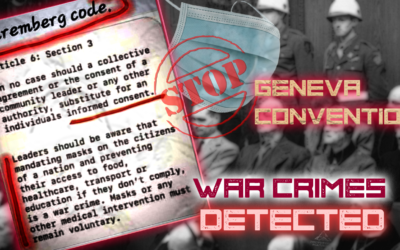 Former New York Times reporter Kurt Eichenwald’s new book, published last week, provides yet more details about how the the NSA’s unconstitutional warrantless wiretapping program came about, and confirms that even top Bush Administration lawyers felt there was a “strong argument” that the program violated the law. “Officials might be slammed for violating the Fourth Amendment as a result of having listened in on calls to people inside the country and collecting so much personal data,” Eichenwald wrote, and “in the future, others may question the legality” of their actions.
Former New York Times reporter Kurt Eichenwald’s new book, published last week, provides yet more details about how the the NSA’s unconstitutional warrantless wiretapping program came about, and confirms that even top Bush Administration lawyers felt there was a “strong argument” that the program violated the law. “Officials might be slammed for violating the Fourth Amendment as a result of having listened in on calls to people inside the country and collecting so much personal data,” Eichenwald wrote, and “in the future, others may question the legality” of their actions.
Yet even today, eleven years later, the government continues to claim that no court can judge the program’s legality. In the next month, the government will argue—in EFF’s case in federal district court and ACLU’s case in the Supreme Court—that courts must dismiss the legal challenges without ever coming to a ruling on the merits.
Eichenwald’s book, 500 Days: Secrets and Lies in the Terror Wars, describes how the NSA’s illegal program—what he calls “the most dramatic expansion of NSA’s power and authority in the agency’s 49 year history”— was devised just days after 9/11 to disregard requirements in the Foreign Intelligence Surveillance Act (FISA). Instead of getting individualized warrants to monitor Americans communicating overseas, the Bush administration unilaterally gave the NSA the power to sweep up millions of emails and phone calls into a database for analysis without court approval:
Connections between a suspect e-mail address and others—accounts that both sent and received messages there, whether in the United States or not—would be examined. At that point, a more detailed level of analysis would be applied creating something of a ripple effect. The suspect e-mail address would lead to a second, the second to the accounts it contacted.
In other words, the NSA was given the green light to warrantlessly spy of Americans communications on American soil—a power that was illegal under FISA. And the government—instead of finding probable cause for surveillance like the Constitution requires—started using a burden of proof akin to the game Six Degrees from Kevin Bacon.
Eichenwald’s reporting, focused on the immediate aftermath of 9/11, unfortunately overlooks the NSA’s longstanding desire to live “on the network” reflected in its presentations to the incoming Bush Administration officials in December, 2000. The idea that the NSA only came up with this idea after 9/11 isn’t really accurate.1 But regardless, Eichenwald’s reporting makes clear that Bush administration officials were terrified that this program would become public.
Of course, after several years, much of the NSA’s program did become public when the New York Times exposed its existence in their 2005 Pulitzer Prize winning investigation. Virtually every major news organization in the US subsequently reported on the NSA and its mass spying programs, which led to congressional investigations and a multitude of lawsuits—two which will be argued in the coming month.
In EFF’s lawsuit, in addition to a mountain of public information including many governmental admissions, the court will see evidence from AT&T whistleblower Mark Klein showing blueprints and photographs of the NSA’s secret room in AT&T’s facility in San Francisco. Three more NSA whistleblowers, including William Binney a former high ranking official involved with the program during its infancy, also submitted affidavits laying out how the NSA illegally spied on Americans in the aftermath of 9/11.
Despite this all of this, the government recently filed a motion in the Northern District of California invoking the controversial “state secrets” privilege. Essentially, the government argues that—even if all of the allegations are true—the case should be dismissed entirely because admitting or denying any fact would potentially endanger national security, even in the face of the government’s own craftily wordsmithed “denials” before Congress and elsewhere.
In the ACLU’s case going before the Supreme Court this term, a group of journalists, lawyers, and human rights activists has sued over surveillance conducted after the passage of the FISA Amendments Act (FAA). The FAA was passed in 2008 and formalized some of the admitted portions of NSA’s program, allowing emails and phone calls to and from from overseas to continue to be acquired without a warrant. The government only needs one general court order to target large groups of people—even entire countries—communicating to Americans for an entire year.
The plaintiffs, given that their professions, regularly talk to people who are almost certainly spied on. They argue that surveillance of them without warrants renders the statute unconstitutional. But the government contends the case must be dismissed on “standing” grounds because the plaintiffs can’t prove with certainty they have been surveilled, because, in a perfectly circular argument, the government won’t “admit” they have been surveilled, as if public admissions by the government is the only way to prove illegal wiretapping.
As the ACLU writes, “The government theory of standing would render real injuries nonjusticiable and insulate the government’s surveillance activities from meaningful judicial review.” The same can be said of the ‘state secrets’ privilege in EFF’s case. The government is contending they can use government secrecy as a sword to terminate judicial accountability. It doesn’t matter how much evidence is in the public domain, just by telling the Court that the information implicates “national security,” they can wall off entire subject matters from judicial oversight, effectively hiding illegality, unconstitutionality along with embarrassing or overreaching acts by NSA spooks and others.
Eichenwald is just the latest in a long line of journalists to discuss and organize details about the NSA’s unconstitutional program. At this point the American people are well aware of the NSA’s actions – only the courts have been kept in the dark. And if the courts go along with blinding themselves, the government will have been given a license to violate the law and constitution long into the future.
via EFF.org



